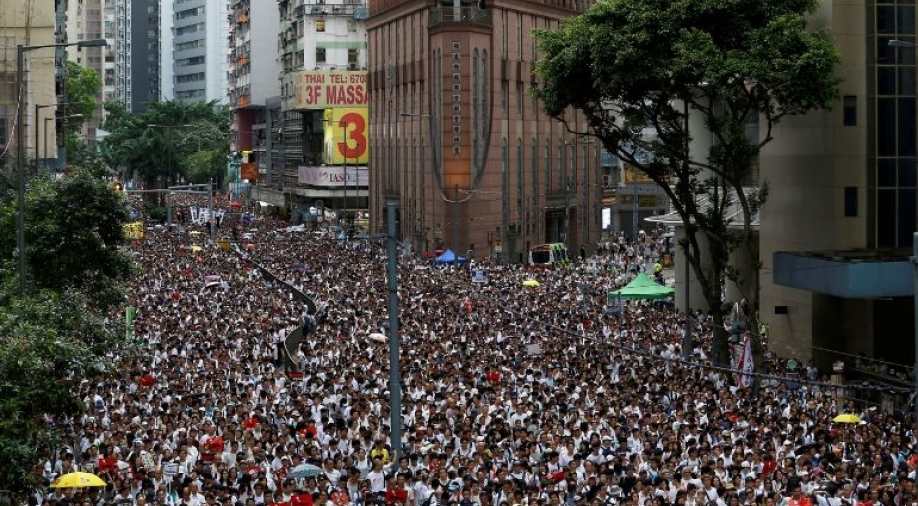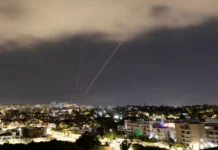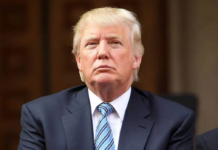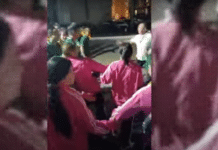Protests escalate as government refuses to bend over extradition law
Dikang, Socialist Action (CWI in Hong Kong)
One million marchers on June 9 vented their anger and defiance against the government’s proposed amendments to the extradition law. It was the biggest demonstration in Hong Kong since the handover to Chinese rule, matched only by the demonstration in June 1989 immediately after the Beijing massacre. Hong Kong is known for its “protest culture”, but this was on another level with one in seven of the population joining the demonstration.
Hong Kong is now in a state of full-blown government crisis, mass unrest and protest. The government’s crass stupidity and stubbornness has resurrected a mass movement that most observers did not believe was possible less than five years after the defeat of the Umbrella Revolution.
Chief Executive Carrie Lam’s amendments to the extradition law, which serve to legalise the Chinese dictatorship’s abductions of political dissidents, even those just transiting through Hong Kong’s international airport, are seen as the most serious attack yet on Hong Kong’s fragile and badly damaged democratic rights, won through decades of mass pressure and activity. In China’s judicial system there is no such thing as a fair trial and 99 percent of convictions are based on confessions rather than evidence.
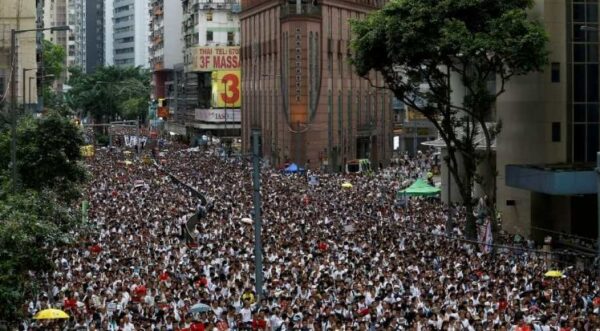
Counter-revolution and ramped up authoritarianism have been the main trends since the defeat – through internal exhaustion and lack of a strategy to go forward – of the 2014 Umbrella Revolution. That movement still holds the record as the longest mass occupation of any major city in the world (79 days).
Therefore, the June 9 demonstration was the equivalent of a dam bursting and releasing a tidal wave of anger and emotion. However, the mood of the marchers was different to previous mass protests in several important respects. History is not repeating itself and this movement is not starting from square one. Many marchers took part despite believing the government will not change its mind and withdraw the proposed law.
This has been borne out starkly. On the night of the demonstration, with thousands still on the streets, the government announced its intention to press ahead. The government has hardened its position further since the demonstration in what amounts to a high stakes, reckless game of brinkmanship. Its credibility is already in ruins but it draws comfort from the fact that it cannot be voted out of office, it’s support parties have enough votes to secure passage of the law (after six opposition legislators were purged in 2016-17), and behind it stands the world’s most powerful dictatorship.
Clearly, this time will not be a simple re-run of 2003, often cited as a parallel, when the legendary ‘7.1’ demonstration of half a million people defeated the government’s plan to introduce Article 23, a draconian national security law.
That movement ended the rule of Tung Chee-hwa, Hong Kong’s first Chief Executive. Carrie Lam is more hated even than Tung, and the political battles of the past sixteen years have left deep scars, but Lam’s government is doubling down over the extradition law, fearing that to abandon this project now would damage the government beyond repair but also – more significantly – powerfully undermine the fear factor wielded by the Chinese dictatorship (CCP, so-called Communist Party). Fear and an aura of invincibility are crucial political ingredients for the CCP’s continued rule in China, let alone Hong Kong.
While offering additional almost laughably cosmetic ‘concessions’ after the June 9 demonstration, the government actually upped the ante, bringing forward the vote in the Legislative Council (Legco) by a week, to June 20. A pro-government legislator told Hong Kong’s South China Morning Post, anonymously, that the government needed to ‘stare down’ the mass movement, convinced this was now the least damaging course of action. The pro-Beijing capitalist establishment feels they have passed the point of no return. The damage from this mess has already been done, and there is a need to pass the law to make clear that mass pressure is powerless in Hong Kong/China.
The struggle has also become entangled with the CCP’s conflict with the US, which is escalating rapidly from trade and tech issues into a full-blown geo-strategic trial of strength. Beijing cannot afford to show weakness in Hong Kong, where foreign companies have also raised objections to the extradition law.
Who’s idea was this?
The initiative for the extradition law came from Lam’s government with Beijing initially only a passive bystander. Lam wanted desperately to please her master Xi Jinping, at the same time as she has tried to manoeuvre against other pro-Beijing factions to deflect and delay implementation of Article 23 legislation. She rightly understood that issue would risk reigniting a mass movement despite the setbacks suffered by the democracy struggle in the past five years.
Lam’s plan has backfired spectacularly, with the extradition law generating similar levels of mass outrage as if she had gone for Article 23. Her government has thus set a new benchmark for ineptitude while Lam has also doomed herself to be a one-term Chief Executive. Beijing must wait even longer it seems for a Hong Kong leader who can actually complete a second term in office. (This, despite the fact the Chief Executive is ‘elected’ by a small committee, not by the public at large).
This saga led to a growing split within the city’s pro-Beijing capitalist establishment, which left Beijing no choice but to get directly involved, bashing heads together to impose discipline in the pro-regime camp. From this point on Beijing and Xi personally were on the hook and could not just stand back and allow the law to fail with Lam as the patsy.
Despotism’s pros and cons
This incident shows the frailties, byzantine crosscurrents and contradictions which are part of the fabric of China’s despotic system. “Heaven is high and the emperor is far away” as the proverb goes. The central government in Beijing is locked in a continual struggle with China’s economically powerful regions, many bigger than most countries. Xi Jinping’s concentration of personal power, viewed as a sign of strength and resolve by most commentators, is equally an admission of the depth of centrifugal pressures that Xi’s leading group are fighting to control.
Thus, any ‘weakness’ in Hong Kong, or retreat in the face of mass pressure, would immediately feed into the ongoing power struggle in mainland China. And this is before we look at the effect this could have on the Chinese masses, where discontent is probably higher today than even in 1989.
This also underlines the difference between China’s dictatorial capitalism and the bourgeois democracies in Western countries. For more than a decade the Chinese regime has felt vindicated in refusing to relax its repressive grip – on the contrary its grip has tightened significantly – because most ‘democracies’ are in disarray, with precarious or zombie governments like in Britain, the rise of destabilising populists such as Trump, and other serious problems. In contrast, China’s technocratic authoritarianism has won many admirers among capitalists in the West who say it “gets results”.
But the Chinese system lacks the flexibility of bourgeois democracy, with its many political ‘safety valves’ for releasing mass pressure. In a crisis, the capitalists in the West can often use an election to defuse or divert mass pressure, introduce a ‘new face’ who can buy time with a honeymoon period (although these breathing spaces become shorter and shorter as capitalism’s woes pile up).
China’s authoritarian system is increasingly stuck in a cycle that only allows development in a single direction: towards more repression and hardline rule, from Xinjiang’s gigantic prison camps to the deepening political crackdown in Hong Kong. At some point, of course, this process can only end one way – in a social explosion. This is what is happening in Hong Kong today, with tremendous uncertainty hanging over the next days and weeks.
The same dynamic is also evident in China’s relationship with Taiwan, which the CCP claims as its territory, an idea strongly opposed by most Taiwanese. Here also the stakes are very high as Taiwan has become a crucial political chess piece in the US-China conflict.
The current political crisis in Hong Kong is having a huge effect on the island. In January, Taiwan will hold presidential elections, which look to be the most polarised since military rule ended thirty years ago. The incumbent, Tsai Ing-wen of the independence-leaning Democratic Progressive Party, is for reasons of political survival supporting the mass protests in Hong Kong and using this issue to attack the Chinese regime and Taiwan’s main opposition, the Kuomintang.
With his hardline stance on Hong Kong, Xi has become pure ‘Taiwan repellent’ to the majority of Taiwanese. Instead of undermining Tsai’s DPP and coaxing Taiwan closer economically and politically to China, the CCP has further revealed itself as a monster in the eyes of the Taiwanese people during these events. The only strategy then available to Beijing is more bellicose speeches and threats to use military force, which again further alienates the Taiwanese masses.
Strike call is a turning point
In Hong Kong the situation is developing at high speed. On June 4, 180,000 came out to commemorate the 30th anniversary of the Beijing massacre. Five days later the same park saw one million gather to march against Lam and her extradition law. The government’s reaction, not to offer concessions but to move ahead even more forcefully, with implied threats to take even more measures against the pro-democracy camp, makes this a ‘make or break’ situation.
Less than 24 hours after the June 9 demonstration, the first groups – small businesses, artists, social workers – were posting calls for strike action on social media. A day later, 3,000 teachers had signed a petition demanding their union, the PTU, call a strike. Bus workers announced a work-to-rule on the same day and airline workers also began petitioning their union. Students and many other groups have begun to discuss strike action.
This is a development that is historic for Hong Kong. What would be far less dramatic perhaps in Greece, France or South Korea, is for Hong Kong a revolutionary step, a political awakening, looking to a weapon that has never before been used in the struggle against autocracy. The weakness and low self-confidence of the workers’ movement in Hong Kong has been an Achilles heel of the mass struggles to date.
The Civic Rights Front, the umbrella group which has organised the mass protests against the extradition law, has now taken the very welcome and necessary step of calling for a one-day strike on June 17, “a workers’ strike, a student strike and a market strike” [i.e. shops and small businesses]. If this call is followed up decisively, with real organisation and preparation, the strike can get a major response and be a turning point in the struggle.
The HKCTU (pro-democracy trade union confederation) has an opportunity to massively increase its role and influence in these events by showing a determined and organised lead for the coming strike, rather than just tail-ending these developments. There is a lack of organisation and experience, low trade union density, but the mood to fight back opens many possibilities for new workplace committees to be set up, strike meetings and union organisation drives in non-union sectors.
One of the reasons the Umbrella Movement failed to force concessions from the government was that strike action was never discussed, a huge weakness. Socialist Action (CWI in Hong Kong) has campaigned for a Hong Kong-wide political strike for several months, since the start of the struggle against the extradition law, based on an assessment of what kind of struggle would be needed to stop a law so heavily invested with prestige by the Hong Kong and Chinese regimes.
We were the only organisation demanding a strike on the June 9 demonstration, in 10,000 leaflets we handed out, in our banner slogans and speeches. It is a very important breakthrough therefore that the idea of a strike is gaining traction among broad layers.
Socialists and the democracy struggle
For socialists and the workers’ movement the struggle against repressive laws and to defend democratic rights in Hong Kong is a crucial one. It is connected to the struggle in mainland China in support of the nascent workers’ movement and for a political alternative to the CCP’s authoritarian capitalism.
The democracy struggle which has been waged with ebbs and flows for more than 30 years in Hong Kong is a classic example of a ‘cross class’ movement in which the mass protests are made up of ordinary workers, pensioners, students and middle-class professionals, but the leadership is dominated by bourgeois and petit bourgeois liberals, the pan-democratic opposition parties, and a multitude of likeminded NGOs. These organisations are small, closed, lacking any real membership structures and advocate a non-political approach. The fact that the democracy struggle has stalled in Hong Kong is largely due to the inability of these groups to offer real leadership.
The organised presence of the workers’ movement has been minimal – with very few trade union banners for example on the million-strong June 9 demonstration. A major reason is that the union leaders, as in the case of the HKCTU, only follow in the footsteps of the bourgeois pan-democratic politicians and do not fight for independent working class policies.
This underlines the key role that socialists and trade union activists can play in these movements, especially with the decisive new features of the struggle emerging today as the strike weapon for the first time enters the consciousness of a growing layer, a shift that we helped to bring about.
Unlike some sectarian groupings who refuse to engage with the democracy struggle, seeing it as unconnected with workers’ interests, socialists intervene and aim to play a prominent role in these movements, to connect with the most radical layers and fight for our programme, which links fighting democratic demands with demands to break with capitalism and adopt socialist policies as the only way to end the social crisis in Hong Kong, the most unequal society in Asia.
Under Carrie Lam, Hong Kong’s wealth gap has widened to its greatest level in 45 years according to Oxfam. Far from lending their voices to calls for more democracy, the capitalists in Hong Kong are completely integrated into the system of authoritarian government which protects their profits and extremely low taxes from the evil of ‘welfarism’.
Socialist Action has been an active force in all democracy struggles since our foundation nine years ago. With concrete proposals – such as strike action – and by explaining what kind of struggle is needed to defeat not only the Hong Kong puppet government but the much bigger dictatorship that stands behind it, we also throw into the sharp focus the political weaknesses and lack of fighting strategy of the pan-democratic leaders.
These politicians completely underestimated the explosive mood against the extradition law and have more or less been dragged along by the current mass movement. Their attachment to capitalism, not seeing that it is a major barrier to achieving democratic rights in the concrete conditions of Hong Kong and China, means they always hesitate and fear mass struggles that can become radicalised and move beyond their control. In today’s situation they are supporting the idea of strikes against the extradition law, but they are not leading or acting to organise this, rather paying lip service to moods developing among the masses.
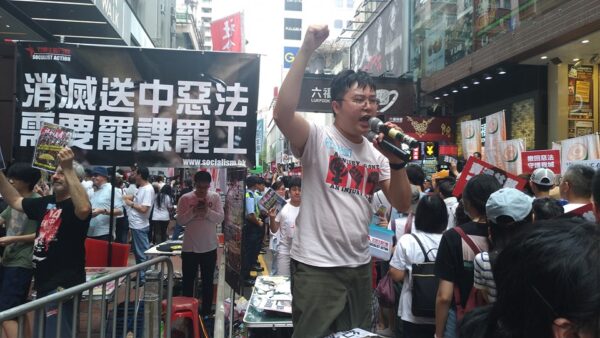
Spread the struggle to China
The Chinese regime and its Hong Kong puppet government are now stumbling into multiple crises, many as in this case of their own making. Their strategy when challenged is to become even more hardline. Explosive tensions are therefore building in Hong Kong and in China.
The discussions today about a political strike against the Hong Kong government’s antidemocratic law represents a historic new stage of the mass struggle, with huge implications whatever should happen next. The next important breakthrough is for the Hong Kong mass struggle to shed its self-imposed isolationism (aggravated by the phenomenon of localism in recent years) to actively link up with the mass discontent rumbling beneath the dictatorships’ foundations in China. Especially this applies to the emerging workers’ movement in China which is facing even more ruthless repression, but has shown incredible heroism and strength. When these forces are united and organised around a new working class party, with a clear programme linking revolutionary democratic demands to a decisive break with capitalism, the dictatorship’s days are numbered.

